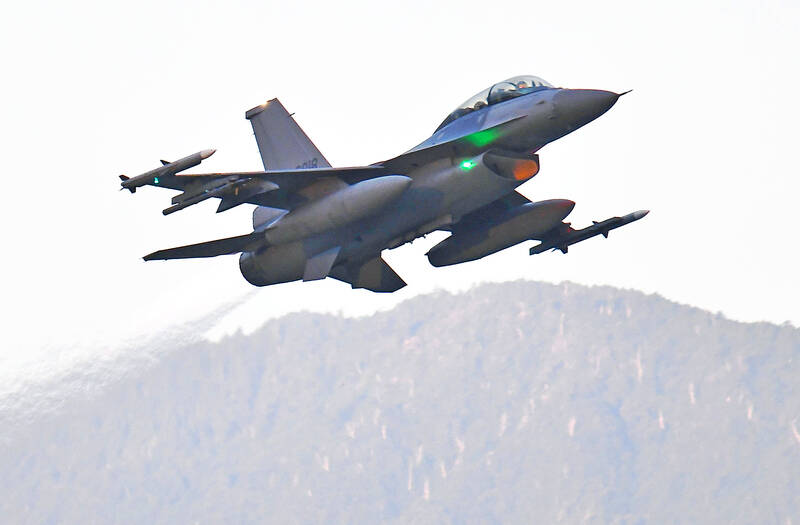Taiwan is to receive the first batch of Lockheed Martin F-16 Block 70 jets from the US late this month, a defense official said yesterday, after a year-long delay due to a logjam in US arms deliveries.
Completing the NT$247.2 billion (US$7.69 billion) arms deal for 66 jets would make Taiwan the third nation in the world to receive factory-fresh advanced fighter jets of the same make and model, following Bahrain and Slovakia, the official said on condition of anonymity.
F-16 Block 70/72 are newly manufactured F-16 jets built by Lockheed Martin to the standards of the F-16V upgrade package.

Photo: Yu Tai-lang, Taipei Times
Republic of China Air Force (ROCAF) pilots are receiving F-16 training in the US to serve as seed instructors, the official said, adding that the program was allocated a budget of NT$36.7 million.
A delegation of Taiwanese Defense Mission to the US, air force generals and F-16 seed instructors are to attend an event marking the roll-off of the jets from the assembly lines, they said.
The late delivery of the jets sparked grave concerns among the involved parties, as two project managers had been sacked by Lockheed Martin and multiple Taiwanese liaison personnel were fired, Ministry of National Defense officials have said.
Taiwan has placed orders on virtually every type of aerial weapon and equipment used by the US Air Force for F-16 jets, including air-to-air missiles, anti-radiation missiles, precision-guided bombs, reconnaissance pods and forward-looking infrared systems.
The list of items Taiwan aims to obtain reportedly includes AGM-158 Joint Air-to-Surface Standoff Missiles, but officials to date have refused to confirm or deny the rumors.

Taiwan is stepping up plans to create self-sufficient supply chains for combat drones and increase foreign orders from the US to counter China’s numerical superiority, a defense official said on Saturday. Commenting on condition of anonymity, the official said the nation’s armed forces are in agreement with US Admiral Samuel Paparo’s assessment that Taiwan’s military must be prepared to turn the nation’s waters into a “hellscape” for the Chinese People’s Liberation Army (PLA). Paparo, the commander of the US Indo-Pacific Command, reiterated the concept during a Congressional hearing in Washington on Wednesday. He first coined the term in a security conference last

Prosecutors today declined to say who was questioned regarding alleged forgery on petitions to recall Democratic Progressive Party (DPP) legislators, after Chinese-language media earlier reported that members of the Chinese Nationalist Party (KMT) Youth League were brought in for questioning. The Ministry of Justice Investigation Bureau confirmed that two people had been questioned, but did not disclose any further information about the ongoing investigation. KMT Youth League members Lee Hsiao-liang (李孝亮) and Liu Szu-yin (劉思吟) — who are leading the effort to recall DPP caucus chief executive Rosalia Wu (吳思瑤) and Legislator Wu Pei-yi (吳沛憶) — both posted on Facebook saying: “I

The Ministry of Economic Affairs has fined Taobao NT$1.2 million (US$36,912) for advertisements that exceed its approved business scope, requiring the Chinese e-commerce platform to make corrections in the first half of this year or its license may be revoked. Lawmakers have called for stricter enforcement of Chinese e-commerce platforms and measures to prevent China from laundering its goods through Taiwan in response to US President Donald Trump’s heavy tariffs on China. The Legislative Yuan’s Finance Committee met today to discuss policies to prevent China from dumping goods in Taiwan, inviting government agencies to report. Democratic Progressive Party Legislator Kuo Kuo-wen (郭國文) said

The Ministry of Economic Affairs has fined Taobao NT$1.2 million (US$36,900) for advertisements that exceeded its approved business scope and ordered the Chinese e-commerce platform to make corrections in the first half of this year or its license would be revoked. Lawmakers have called for stricter supervision of Chinese e-commerce platforms and more stringent measures to prevent China from laundering its goods through Taiwan as US President Donald Trump’s administration cracks down on origin laundering. The legislature’s Finance Committee yesterday met to discuss policies to prevent China from dumping goods in Taiwan, inviting government agencies to report on the matter. Democratic Progressive Party